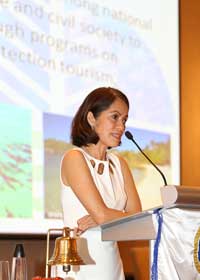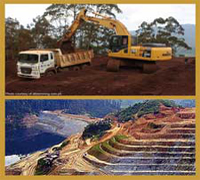DENR, CIVIC GROUPS JOIN FORCES ANEW TO REHABILITATE MARIKINA WATERSHED
he Department of Environment and Natural Resources (DENR) has once again joined forces with two service-oriented organizations to rehabilitate the 26,125-hectare Upper Marikina River Basin Protected Landscape (UMRBPL), one of Metro Manila's sources of water supply.
Around 120 volunteers from the Rotary Club of Makati-Rockwell (RCMR) and the Career Executive Service Board (CESB) trooped to an upland barangay within the UMRBPL over the weekend to plant some 2,000 native tree seedlings.
The activity was part of the commitment of the RCMR and CESB to help the DENR address the loss of forest cover in UMRBPL due to illegal activities like slash-and-burn farming, charcoal making and timber poaching. The two service-oriented groups have been partners of the DENR since 2010.
This is the second time that the RCMR and CESB volunteers have conducted reforestation activities in Sitio San Ysiro in Barangay San Jose, Antipolo City to fulfill their commitment to reforest at least seven hectares of open and denuded forestland allotted by the DENR under the National Greening Program or NGP.
The tree-planting activity was led by DENR Undersecretary Jonas Leones, RCMR president Kris Gorra Dancel and CESB executive director Ma. Anthonette Lllones.
The effort was an offshoot from the success the tripartite partnership had in the the roadside greening of the South Luzon Expressway which saw the planting of some 18,423 tree seedlings from 2010 to 2014, covering a combined distance of 40 kilometers. The effort posted a survival rate ranging from 70 to 95 percent based on the monitoring report of the DENR-Region IVA office in Calamaba, Laguna.
Volunteers from the Region IV office of the Department of Public Works and Highways (DPWH), led by Cavite District Engineer Arthur Pascual Jr., also took part in the event.
In October last year, the volunteers planted some 1,000 native fruit-bearing and forest trees in the area, covering two hectares of land and has an elevation of 350 meters above sea level.
Anchored on the theme “Preventing Disasters, Providing Livelihood,” the tree-planting project in UMRBPL has some 20 households beneficiaries, each consisting of as many as three families, who were hired to conduct maintenance and protection activities on the planted areas.
The beneficiaries are also entitled to harvest the fruits from the trees planted and grown at the site.
The UMRBPL is considered one of the most important protected areas being supervised by the DENR as the watershed is a major source of water for Metro Manila and nearby areas.
The river basin was placed under the administrative jurisdiction and control of the DENR by virtue of Presidential Proclamation 296 issued in 2011. The entire area covers the upper reaches of the Marikina watershed in the province of Rizal, straddling Antipolo City and the towns of Baras, Rodriguez, San Mateo and Tanay.
The flooding in Metro Manila and other nearby low-lying areas during tropical storm 'Ondoy' (international name: Ketsana) in 2009 exposed extent of forest loss and degradation in UMRBPL, fueling public-private partnerships on rehabilitating the watershed to prevent similar occurrences in the future.
Reforestation and alternative livelihood activities for communities are among the several measures the government and its partners have undertaken to help rehabilitate the UMRBPL.
The area originally covered some 27,980 hectares when it was established as "Mariquina Reserve" by virtue of Executive Order (EO) 33 issued by US Civil Gov. Luke Edward Wright in 1904, banning the settlement, entry, sale or disposition of a vast tract of land to “protect the watershed of the Marikina River, the source of water supply of the city of Manila.”
Portions of the reservations were however excluded from the area by executive fiats issued from 1904 to 1996 and these were converted into residential, commercial and industrial areas, contrary to the intent of the EO 33 to protect and preserve the area. ###
- Details
- Parent Category: News & Events
- Category: Press Releases




